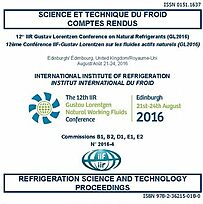
Summary
Transport (mobile) refrigeration (truck, trailer and marine containers) and transport air-conditioning (bus and rail) applications offer designers unique hardware and applications challenges in selecting new refrigerants. These systems are mobile and have to work efficiently and reliably in wide range of ambient temperatures whether in the cold environment of north of Norway or in the hot climate of Saudi Arabia. Transport refrigeration systems have to be adaptable to transport a wide variety of products that can change daily from fresh fruit to deep frozen as well as change multiple climate zones. These products must also be robust enough to withstand ground, sea and product unloading-induced vibration with additional specific application restrictions on weight, space limitations, energy consumption and safety. Selection of natural refrigerant for these applications brings new challenges to be solved such as; safety (flammability, toxicity and high pressure), achieving equal or greater efficiency across the same range of operating conditions as today’s HFC based products, implementation of new unit controls to maintain wide product temperatures. This paper will provide a manufacturer’s experience exploring possible natural refrigerant solutions for transport applications with carbon dioxide (CO2, R744) and hydrocarbons (specifically propane, R290). An overview of the refrigerant selection process, the applications investigated, test findings, challenges and outcomes from ongoing investigations will be presented in the paper. In addition, a new evaluation methodology of utilizing global climate zone data of the impact on
product efficiency contributions to life cycle climate performance (LCCP) will be shown. In general, currently natural refrigerants are not able to maintain the societal demands of safety, efficiency and reliability while balancing the need for lower GWP impact. Significant design compromises would be needed to be accepted to use flammability (hydrocarbons) or significant technology gaps remain to improve efficiency (CO2).
Available documents
Format PDF
Pages: 9 p.
Available
Public price
20 €
Member price*
Free
* Best rate depending on membership category (see the detailed benefits of individual and corporate memberships).
Details
- Original title: Manufacturers experiences with developing transport applications using natural refrigerants.
- Record ID : 30019185
- Languages: English
- Source: 12th IIR Gustav Lorentzen Conference on Natural Refrigerants (GL2016). Proceedings. Édimbourg, United Kingdom, August 21st-24th 2016.
- Publication date: 2016/08/21
- DOI: http://dx.doi.org/10.18462/iir.gl.2016.1167
Links
See other articles from the proceedings (140)
See the conference proceedings
Indexing
-
Themes:
Road transport;
Marine transport;
CO2;
Hydrocarbons - Keywords: Natural refrigerant; Safety; Refrigerated transport; R744; R290; Performance; LCCP; Mobile air conditioning
-
Analytical study on performance of R134a, R404A...
- Author(s) : SHIN Y., KIM Y., KIM M., CHO H.
- Date : 2021/08/31
- Languages : English
- Source: 13th IEA Heat Pump Conference 2021: Heat Pumps – Mission for the Green World. Conference proceedings [full papers]
- Formats : PDF
View record
-
Development of R290 transport refrigeration sys...
- Author(s) : COLBOURNE D., SOLOMON P., WILSON R., et al.
- Date : 2016/08/21
- Languages : English
- Source: 12th IIR Gustav Lorentzen Conference on Natural Refrigerants (GL2016). Proceedings. Édimbourg, United Kingdom, August 21st-24th 2016.
- Formats : PDF
View record
-
Analysis of an advanced R744 cycle and its impa...
- Author(s) : KUJAK S., SCHULTZ K.
- Date : 2018/06/18
- Languages : English
- Source: 13th IIR Gustav Lorentzen Conference on Natural Refrigerants (GL2018). Proceedings. Valencia, Spain, June 18-20th 2018.
- Formats : PDF
View record
-
Low GWP refrigerants in transport refrigeration...
- Author(s) : POOLMAN C., PAPAS P., RUSIGNUOLO G., et al.
- Date : 2016/08/21
- Languages : English
- Source: 12th IIR Gustav Lorentzen Conference on Natural Refrigerants (GL2016). Proceedings. Édimbourg, United Kingdom, August 21st-24th 2016.
- Formats : PDF
View record
-
Characterisation and thermal performance of a R...
- Author(s) : HUAN Z., RAMAUBE M., MOLUBE N. J-C.
- Date : 2017/04/23
- Languages : English
- Source: 5th IIR Conference on Thermophysical Properties and Transfer Processes of Refrigerants.
- Formats : PDF
View record
